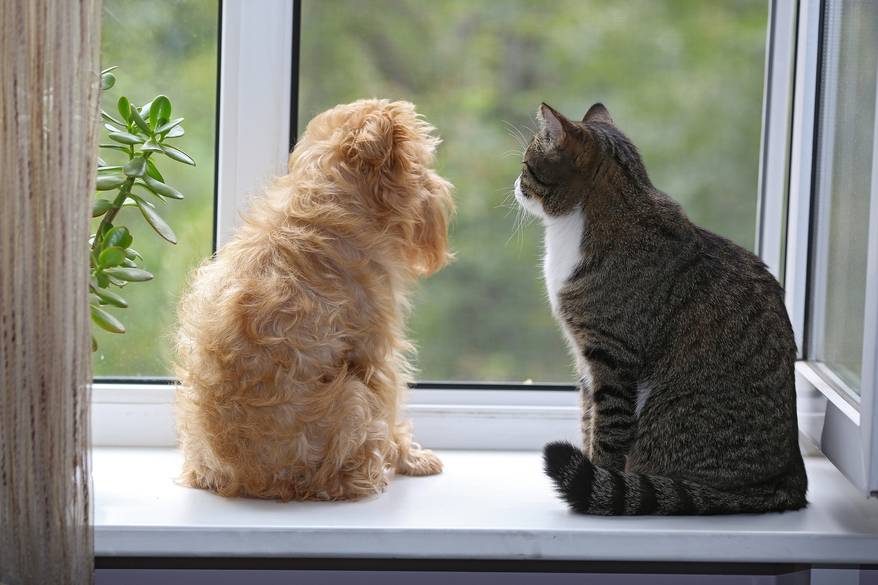
-
Find the right food for your pet
Take this quiz to see which food may be the best for your furry friend.
Find the right food for your pet
Take this quiz to see which food may be the best for your furry friend.
Featured products
 Adult Healthy Cuisine Roasted Chicken, Carrots & Spinach Stew Dog Food
Adult Healthy Cuisine Roasted Chicken, Carrots & Spinach Stew Dog FoodDelicious roasted chicken paired with tender vegetables in a succulent stew
Shop Now Small & Mini Savory Stew with Chicken & Vegetables Dog Food
Small & Mini Savory Stew with Chicken & Vegetables Dog FoodA delicious complement to the nutrition of Science Diet Small & Mini 7+ dog food
Shop Now Adult 7+ Perfect Digestion Chicken, Whole Oats & Brown Rice Recipe Dog Food
Adult 7+ Perfect Digestion Chicken, Whole Oats & Brown Rice Recipe Dog FoodScience Diet's breakthrough nutrition supports ultimate digestive well-being & healthy microbiome for dogs age 7+
Shop NowFeatured products
 Adult Savory Entrée Can Variety Pack Cat Food
Adult Savory Entrée Can Variety Pack Cat FoodPrecisely balanced nutrition with the delicious taste of savory minced chicken to help fuel the energy needs of cats during the prime of their life
Shop Now Adult 7+ Tender Tuna Dinner Cat Food
Adult 7+ Tender Tuna Dinner Cat FoodWith delicious chunks in a decadent gravy
Shop Now Adult 7+ Senior Vitality Chicken & Vegetable Stew Cat Food
Adult 7+ Senior Vitality Chicken & Vegetable Stew Cat FoodImproves Everyday Ability to Get Up & Go
Shop Now -
Dog
- Dog Tips & Articles
-
Health Category
- Weight
- Food & Environmental Sensitivities
- Urinary
- Digestive
- Joint
- Kidney
-
Life Stage
- Puppy Nutrition
- Adult Nutrition
- Senior Nutrition
Cat
- Cat Tips & Articles
-
Health Category
- Weight
- Skin & Food Sensitivities
- Urinary
- Digestive
- Kidney
-
Life Stage
- Kitten Nutrition
- Adult Nutrition
Featured articles
 Do Dogs and Cats have Belly Buttons?
Do Dogs and Cats have Belly Buttons?Learn whether cats & dogs have belly buttons like humans, what the function is, and if there are any health concerns associated with it.
Read More Why Are Dogs and Cats So Cute?
Why Are Dogs and Cats So Cute?If waggy puppy dog tails and furry kitten yawns make you swoon, you're not alone. Why are cats so cute? And, dogs too! Let's find out!
Read More Does My Pet Hate Me?
Does My Pet Hate Me?Learn tips for bonding with your pet if you've ever thought, 'My dog doesn't like me, or 'Why do I have a standoffish cat?'
Read More -


It goes without saying that the loss of a pet comes as a hard blow to you and your family. But what about the non-human members of your family? It's well-documented that animals are capable of experiencing grief and loss, so it should come as no surprise that the death of a pet has an impact on the remaining animals in your household. Keep reading to learn how you can help your grieving pets in the event that your family is faced with such a loss.
Grief in Dogs and Cats
It's not known for certain whether dogs or cats have the capacity to understand the finality and significance of the death of a pet, and any evidence that they do is purely anecdotal, says PetPlace. Cats and dogs tend to notice when a companion is no longer showing up in their lives, and they often react to that absence in a way that makes it clear that they miss their friend. Even if your pets weren't close and the surviving pet doesn't appear to notice the loss of a pet, dogs and cats are extremely sensitive to the emotional states of their human guardians and may become sad or despondent because they're sensing those emotions in their pet parents. Dogs can have a particularly rough time adjusting to a change in the family makeup because of their pack-oriented nature, says PetsBest. Dogs tend to see the family, including other pets, as a unit and come to understand their position and role in relation to the rest of the pack. When another pack member dies, this may leave your dog feeling uncertain about his role and how he fits in.
How to Recognize a Grieving Pet
Individual dogs and cats react to loss in different ways. Just as with people, there is no "right" or "wrong" way for your pet to grieve. Some pets may not appear to notice the absence of the deceased, while some may appear to feel the loss quite heavily. In general, here are some signs that your pet might be struggling with grief:
- Changes in appetite
- Acting withdrawn or despondent
- Whining or howling in dogs, or yowling and crying in cats
- Changes in personality; your aloof cat suddenly wants lots of attention, or vice versa
- Pacing or searching the house for the lost pet
- Hiding from or avoiding other family members
- Changes in grooming or bathroom habits, especially in cats
Your pet might also show signs of separation anxiety, such as crying and carrying on when you leave or, as is more common regarding cats, engaging in destructive behavior, such as scratching furniture or urinating outside the litter box while you're gone.


Tasty Tips
Young pets may need several visits in their first year for vaccinations. Adult pets generally benefit from annual check-ups, while senior or special-needs pets might require more frequent visits.
Helping Your Grieving Pet
While it's tempting to comfort your pets when they're showing signs of hurting, it's important that you don't try to soothe them while they're engaging in unwanted behaviors. Petting or speaking gently to your dog while he's whining or pacing, for example, will only reinforce this behavior, causing it to continue well past the point that he knows why he's doing it. As hard as it may be to do so, it's best to ignore such behavior. Instead, choose times when your pets are being quiet and give them plenty of attention and reassurance.
Here are some other things you can do to help your grieving pet:
- Stay positive: As hard as it is for you to cope with your own loss, talk to your remaining pets in a calm and upbeat voice as often as possible.
- Engage in new activities: Giving your pets something new to learn or focus on may help distract them from the loss and the uncertainty surrounding it. Dogs, especially, benefit from learning something new that will give them confidence in their pack position.
- Do more of what your pets already love to do. Getting to do something fun and enjoyable with you can go a long way toward helping your pet cope — and will help you feel better, too.
- Talk to your veterinarian. If your pets show signs of separation anxiety or depression that don't improve on their own, contact your vet.
The loss of a pet is a difficult time for your entire household. But remembering to provide comfort and support to your four-footed family members during this time can help aid the grieving process and promote healing for the whole family.


Jean Marie Bauhaus is a pet parent, pet blogger, and novelist from Tulsa, Oklahoma, where she usually writes under the supervision of a lapful of fur babies.
Related products

Precisely balanced nutrition with the delicious taste of savory minced chicken to help fuel the energy needs of cats during the prime of their life

Supports energy level and beautiful fur in mature cats

With delicious chunks in a decadent gravy

Improves Everyday Ability to Get Up & Go
Related articles

Learn whether cats & dogs have belly buttons like humans, what the function is, and if there are any health concerns associated with it.

If waggy puppy dog tails and furry kitten yawns make you swoon, you're not alone. Why are cats so cute? And, dogs too! Let's find out!

Learn tips for bonding with your pet if you've ever thought, 'My dog doesn't like me, or 'Why do I have a standoffish cat?'

If you're struggling with the future of an empty nest as your kids go to college or move away, pets can help ease that transition.

Put your pet on a diet without them knowing
Our low calorie formula helps you control your pet's weight. It's packed with high-quality protein for building lean muscles, and made with purposeful ingredients for a flavorful, nutritious meal. Clinically proven antioxidants, Vitamin C+E, help promote a healthy immune system.
Put your pet on a diet without them knowing
Our low calorie formula helps you control your pet's weight. It's packed with high-quality protein for building lean muscles, and made with purposeful ingredients for a flavorful, nutritious meal. Clinically proven antioxidants, Vitamin C+E, help promote a healthy immune system.


